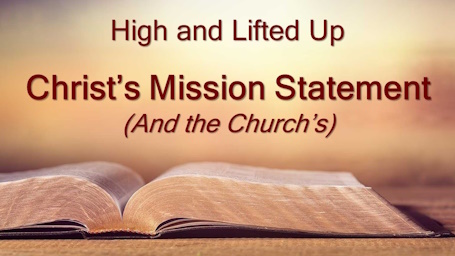ThursdayReflection
1st June 2023
Richard Higginson offers

The Nazareth Manifesto
Jesus' Mission Statement
Right at the start of his ministry Jesus set out his
mission statement:
good news to the poor, release to the captives,
recovery of sight to the blind, freedom for the oppressed.
This remains an inspiration for many business people today.
One of my odder habits is that, for a time at least,
I collected company mission statements.
Eager to discover what companies proclaimed,
I accumulated about 50 before my enthusiasm waned.
I like GlaxoSmithKline's mission statement:
'We have a challenging and inspiring mission to
improve the quality of human life by enabling people to do more,
feel better and live longer'
It would be difficult to improve on this.
Christian faith should keep people alert to the big picture.
Near the beginning of Luke's Gospel (4:16-20) is what some theologians
call the Nazareth Manifesto - Jesus' mission statement.
I know many businesspeople who are inspired by it.
Jesus has just undergone the pivotal experiences which kick-started
his ministry:
his baptism by John, temptation in the wilderness and
empowerment by the Holy Spirit.
The scene is a Saturday morning in the synagogue at Nazareth.
Jesus was probably invited to speak because he had started to
make a name for himself as an authoritative interpreter of
Scripture (Luke 4:15),
though not one who was the pupil of any particular Rabbi.
Jesus chooses to read Isaiah 61:1-2:
Jesus didn't need to invent a mission statement;
he finds one ready-made in the Old Testament.
This passage suited his purposes perfectly,
to the extent that he says
'Today this Scripture has been fulfilled in your hearing'.
The promise of good times no longer lay in the future;
it was being fulfilled in the present - 'today' - and in his person.
He is the Lord's Servant of whom the book of Isaiah speaks.
He is the one anointed by the Spirit, the longed-for Messiah.
So echoing Isaiah, he promises good things to four groups of people:
Good News to the Poor
The poor 'in spirit' included those who felt wretched,
had a low self-esteem, and found it difficult to believe that anyone
loved them.
There was probably a considerable overlap between the materially poor
and the spiritually poor.
Recovery of Sight to the Blind
This phrase doesn't actually occur in the original Hebrew of Isaiah 61.
Jesus appears to have added it from Isaiah 42:7,
the Servant passage which speaks of a 'light to the nations'.
Release to the captives
An alternative translation is 'freedom for the prisoners'.
Here it is likely that Jesus was using language metaphorically.
So far as we know, people were not released from prison as a result
of Jesus' ministry (Barabbas was an unusual exception).
Freedom for the Oppressed
The 'oppressed' are those who are pressed down and therefore
heavily laden. This takes many forms:
economic oppression (employers paying workers little or nothing),
mental oppression (evil spirits possessing vulnerable people) or
religious oppression (teachers imposing on the public a fastidious
understanding of 'the law').
Jesus brought freedom at all these different levels.
Those whose lives he transformed included Mary Magdalene,
rid of the seven demons that had tormented her;
Zacchaeus, inspired to refund those he had defrauded,
which would help them financially; and all who heeded his message
that the law was given for human welfare, not to trap and imprison them.
Relevance Today
This is a compelling passage of Scripture.
James Featherby, during the many years he worked for the City
legal firm Slaughter & May, admitted it might seem unlikely that
one would find the poor, prisoners and oppressed working in the City,
but he knew many examples of desperately needy individuals:
● Those struggling with inadequate resources
● People suffering from a mid-life crisis
● The objects of bullying, gossip and manipulation
● Those who have lost touch with their feelings and can't apologise
● Grumblers, people who over-drink, have no time for their families
and can't turn off their mobiles,
or are driven by targets or their own egos.
But the businesspeople most closely following the Nazareth Manifesto
are those whose employees, and customers, resemble the
socially marginalised people that Jesus had in view.
They are the social entrepreneurs, people who run companies that
have the transformation of society, the reduction of poverty or
environmental sustainability as explicit goals.
One example is the group of Christians who run SonLight Power,
an American company that promotes solar-powered energy in
developing countries, notably Honduras.
The name of the company is a testimony to its inspiration -
the Son of God who is the Light of the World.
Excerpt from Faith, Hope & the Global Economy,
pp.125-130 (edited)
Faith in Business c/o Westminster College,
Madingley Road, Cambridge CB3 0AA